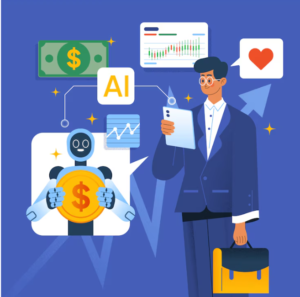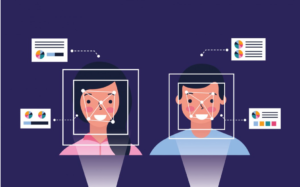Artificial Intelligence (AI) in computer science replicates human behavior and conversation, crafting intelligent machines capable of human-like thinking and responses. These machines execute tasks by processing data inputs. AI manages intricate tasks such as robotics, speech and image recognition, natural language processing, and problem-solving, revolutionizing various domains with its capabilities.

Importance Of AI In Digital Marketing
AI rapidly reshapes digital marketing, writing blogs, managing inquiries, predicting demand, and more, revolutionizing industry practices. In social media, AI moderates content, analyzes user behavior, and suggests personalized content. It spots trends, targets ads, and boosts engagement with tailored content, benefiting users and advertisers alike.
- Better understanding of customers : AI helps marketers understand customers better by analyzing large amounts of data. It finds important information about how consumers behave, what they like, and how they buy things.
- Improved Analytics: AI-powered analytics transforms digital marketing. It provides instant insights on campaign success, helping marketers make fast decisions based on data.
- Automation of repetitive Tasks : In digital marketing, there are many repetitive tasks like creating ads, testing different versions, and scheduling content.
Enhancing Advertising Effectiveness Through AI
AI is transforming advertising, making it more targeted, personalized, and efficient. By leveraging AI technologies, advertisers can better understand their audience, optimize ad campaigns in real-time, and predict future trends, ultimately enhancing the effectiveness of their advertising efforts
· AI helps target ads to the right people : AI analyzes data to find the best audience for ads by looking at things like age and what people do online. This helps make sure ads reach interested people.
· Ads can be made personal with AI : AI analyzes user data to understand preferences, enabling personalized ad campaigns. This boosts relevance, engagement, and conversions in digital marketing.
· AI makes ads better as they run : AI keeps improving ads using live data, changing who sees them, what they say, and where they appear, making ads work better.
· It helps predict what will happen next : AI looks at data to guess what might happen next. It helps make decisions by showing possible future situations.
· AI can create ads automatically : In digital marketing, AI automates ad creation by generating content, selecting visuals, and designing layouts based on predefined criteria, saving time and resources for advertisers.



AI's Impact on Image Recognition Technologies
AI’s Influence on Image Recognition transforms industries, as computers accurately interpret images, driving advancements in healthcare, automotive, and security sectors.
1.Facial Recognition
Facial recognition in marketing uses AI to study faces in images or videos. It finds customer details, emotions, and engagement to customize campaigns. But, it’s important to respect privacy and get consent.
2. Logo Recognition
AI logo recognition helps brand marketers accurately evaluate sponsorship effectiveness, which is traditionally assessed through surveys, event data, or media coverage, often missing social media impact. With AI, marketers can quickly measure extra brand exposure from logos in social media images or videos, improving their understanding of sponsorship performance.
3. AI in content creation
Create compelling content across various platforms, including blogs, social media, and email, while leveraging AI tools for innovative visual content and optimizing keywords to improve SEO and expand content visibility.



Advantages of AI-Powered Image Recognition
· Speed and Accuracy : AI-powered image recognition excels at swiftly and accurately processing vast visual datasets, far surpassing manual methods. AI algorithms can analyze thousands of images per second, even in challenging conditions.
· Scalability: Scalability in AI-powered image recognition refers to its ability to handle diverse visual tasks efficiently and effectively, adapting to different content types and environments. AI-powered image recognition offers scalability, adapting to diverse visual content and environments without the need for extensive manual labeling or rule-based
programming
· Real-Time Results: AI image recognition works well in tasks that need quick recognition, which allows for many uses. It can identify things in live video, recognize faces for security, or translate text from images instantly. For instance, in retail, it lets customers pay for items without a cashier, as it identifies products and bills them instantly. These uses help things work faster and more conveniently.
Disclosure AI’s Potential and challenges in digital marketing
This exploration delves into the promises and obstacles AI presents in digital marketing. It uncovers its transformative potential and navigates the hurdles it brings to the forefront.
1.Personalized Marketing :
· Harnessing AI, marketers access vast data to craft tailored campaigns, driving engagement and conversions
· AI customizes marketing, ensuring messages resonate, strengthening brand-consumer relationships.
2.Enhanced Customer Insights:
· AI-powered analytics tools offer deeper insights into customer behavior
· These insights enable marketers to better understand their target audience
· Marketers can adjust strategies accordingly based on the insights gained
3. Upgrade Content Creation
· AI is a valuable tool for generating content ideas, saving time and effort for marketers.
· It also helps optimize content to improve search engine rankings, ensuring greater visibility online.
· Furthermore, AI can automate tasks like writing product descriptions and email subject lines, making the content creation process more efficient and streamlined.
Ø Challenges
1. Data Privacy Concerns
· AI relies heavily on data, raising privacy concerns.
· Regulations like GDPR impose strict rules on data usage.
· Ensuring compliance is essential for data security.
2. Overreliance on Algorithms
· Over-reliance on AI algorithms can occur.
· Lack of human oversight may lead to biased decisions.
· Misinterpretation of data is a risk.
3. Complexity and Cost
· Implementing AI technologies demands substantial investment.
· This includes staff training and tool acquisition.
· Maintaining infrastructure is also necessary.
· Smaller businesses may find these challenges daunting.
Frequently Asked Questions
1.role of ai in digital marketing ?
In today’s fast-paced digital world, effective marketing strategies are crucial for businesses to stay competitive. Have we seen the emergence of artificial intelligence (AI) as a game-changer in various industries, including digital marketing? AI’s ability to analyze vast amounts of data and automate processes has become an indispensable tool for marketers, revolutionizing how businesses connect with their customers.
2.how ai helps in digital marketing ?
AI transforms digital marketing by analyzing data for personalized campaigns, optimizing content, automating tasks like content creation, and improving customer interactions through chatbots and virtual assistants.
3. How can AI boost digital marketing ?
AI enhances digital marketing by refining targeting, personalizing content, automating tasks, and analyzing data. It improves ad campaigns, content quality, predicts consumer trends, and boosts ROI by streamlining processes.
4. Can AI identify emerging digital marketing trends?
Absolutely, AI can pinpoint emerging trends in digital marketing through extensive data analysis. This allows businesses to adjust their strategies for improved engagement and outcomes.